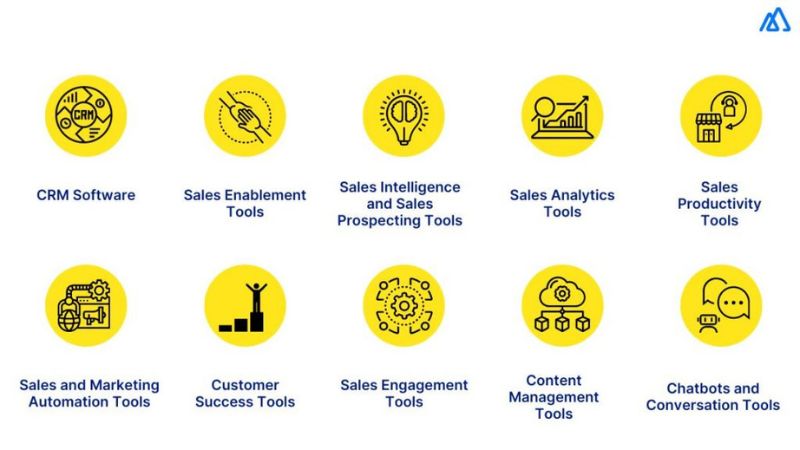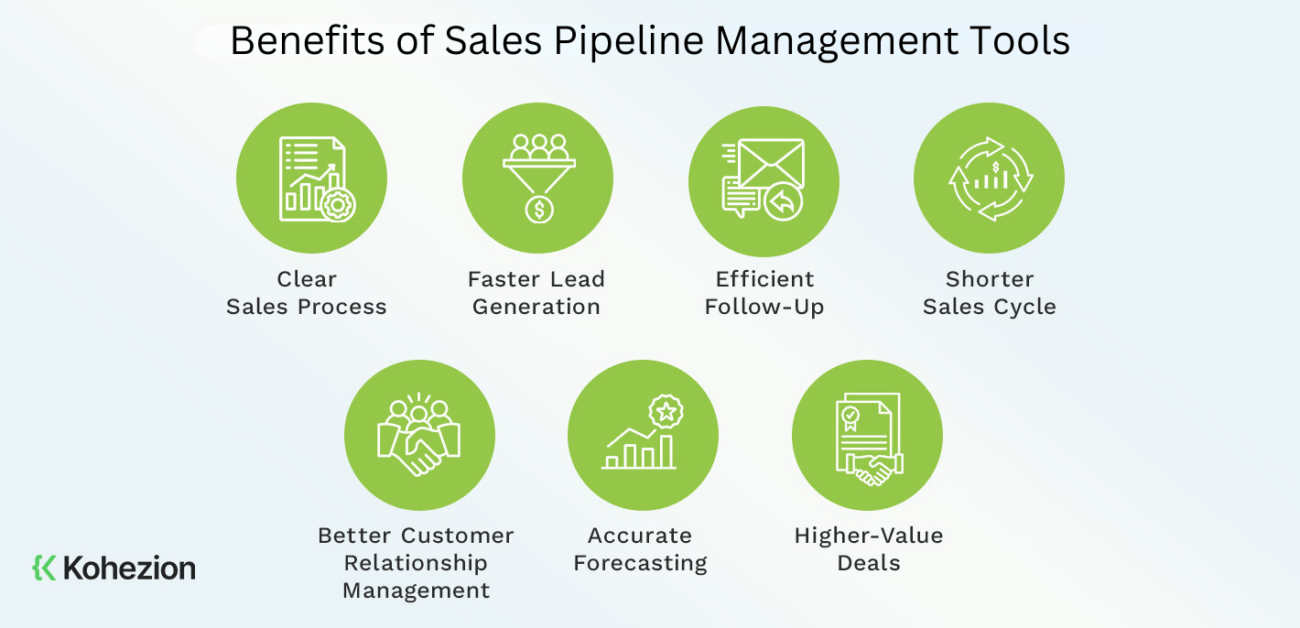10 Practical Sales Tools Exposed: Mastering the Modern Sales Game
Table of Contents

- jaro education
- 14, November 2024
- 11:00 am
The world of sales today is highly competitive, and the choice of sales tools you make can make or break your career. Whether you’re an experienced sales professional or just starting out, having the right strategic sales tools at your disposal can streamline processes, increase productivity, and, most importantly, boost your bottom line.
Let’s dive into ten essential strategic sales tools that empower sales teams to achieve more, and how these sales tools can drive your path to success.

*KylasCRM
1. Customer Relationship Management (CRM) Software
Customer Relationship Management (CRM) software is the backbone of any sales operation, enabling you to manage all customer interactions, data, and communications in one place. CRM software is one of the most crucial sales automation tools, as it helps sales teams keep track of leads, nurture customer relationships, and convert them into lifelong clients.
| CRM Tool | Key Features | Best For |
|---|---|---|
| Salesforce | Customizable dashboards, AI insights, automation | Enterprises with complex processes |
| HubSpot | User-friendly, integrates with marketing tools | Small to mid-sized businesses |
| Zoho CRM | Affordable, customizable, easy integration | Growing teams |
Why CRM Matters for Sales Success
A robust CRM lets you track every touchpoint with leads and customers, creating a cohesive customer success journey that fosters trust and loyalty.
- Pro Tip: Choose a CRM that integrates with your existing tools to avoid data silos and keep all information accessible.
2. Lead Generation and Prospecting Tools
Lead generation tools help sales professionals find potential customers who are likely to be interested in their products. With these sales promotion tools, you can search, identify, and connect with prospective clients based on various demographics, industry, or behavioral patterns.
| Tool | Feature Highlights | Suitable For |
|---|---|---|
| LinkedIn Sales Navigator | Advanced filtering, lead recommendations | B2B Sales |
| ZoomInfo | Data intelligence, accurate contact info | Enterprise-level sales |
| Apollo.io | Email outreach, CRM integration, database | Startups and growing businesses |
Benefits of Lead Generation Tools
Using a powerful lead generation tool saves you time by delivering leads directly into your CRM and increasing the efficiency of cold outreach.
3. Email Tracking Software
Email tracking tools are essential to understanding your audience’s response and engagement with your communications. These sales tools allow you to track when an email is opened, how many times it’s viewed, and even which links are clicked.
| Email Tool | Features | Best For |
|---|---|---|
| Yesware | Real-time notifications, analytics, templates | Sales and outreach teams |
| Mailtrack | Affordable, easy to set up | Small teams |
| HubSpot Sales | Free option, CRM integration | Mid to large-sized teams |
Email Tracking Benefits
With insights from email tracking software, salespeople can follow up with leads who are actively engaging, increasing the likelihood of closing deals.
- Fun Fact: Studies show that following up after a lead opens your email increases reply rates by up to 40%!
*SoftwareSuggest
4. Sales Engagement Platforms
Sales engagement platforms are the most crucial sales automation tools. They integrate emails, calls, and social outreach, enabling sales professionals to communicate with clients across multiple channels.
| Platform | Features | Ideal For |
|---|---|---|
| Outreach.io | Multi-channel communication, analytics | Teams looking for comprehensive engagement |
| SalesLoft | Email sequencing, call tracking | Sales teams focused on outbound sales |
| Groove | Simple workflows, Salesforce integration | Smaller teams needing efficient solutions |
Advantages of Sales Engagement Platforms
These platforms save time by automating repetitive tasks, allowing sales reps to focus on personalizing communications and closing deals.
5. Document Management and E-Signature Software
E-signature software streamlines the signature process, making it faster and easier to close deals and collect signed contracts.
| Tool | Key Features | Ideal For |
|---|---|---|
| DocuSign | Secure, trusted, easy to integrate | Large enterprises |
| PandaDoc | Document analytics, customizable templates | Small to mid-sized companies |
| Adobe Sign | Multi-language support, cloud storage | Teams needing flexibility |
How Document Management Supports Sales
Using e-signature tools speeds up the signing process, reduces paperwork, and ensures that deals are closed without the hassle of physical documentation.
6. Sales Analytics and Reporting Tools
Sales analytics tools track sales performance, identify trends, and provide actionable insights for growth. With these sales tools, you can make data-driven decisions and optimize strategies for better results.
| Analytics Tool | Main Features | Best For |
|---|---|---|
| Google Analytics | Website and traffic insights | Marketing and sales collaboration |
| Looker | Data visualization, real-time analytics | Large enterprises |
| InsightSquared | Sales KPIs, deal tracking | Sales-focused reporting |
Benefits of Sales Analytics
With analytics, you gain a deep understanding of customer behaviors, allowing you to focus on high-potential leads and tailor your approach for maximum impact.
- Pro Tip: Use data insights to set realistic sales goals and measure team performance to stay on target.
7. Social Selling Tools
Social selling tools help sales teams connect with prospects on social platforms, providing a warmer, more personalized approach to lead generation and customer engagement.
| Social Selling Tool | Highlights | Ideal For |
|---|---|---|
| Hootsuite | Schedule posts, monitor mentions | Teams active on multiple networks |
| Buffer | Simple scheduling, link tracking | Individual sellers |
How Social Selling Enhances Sales
Social selling tools let salespeople engage with prospects in a less intrusive manner, building rapport and credibility over time. This approach can lead to increased trust and smoother sales conversions.
8. Pipeline Management Tools
Managing your sales pipeline is crucial for maintaining a clear view of where each deal stands. These sales tools help you track prospects’ progress, analyze potential revenue, and identify bottlenecks in the sales process.
| Pipeline Tool | Key Features | Best For |
|---|---|---|
| Pipedrive | Customizable pipeline, analytics | Small to medium-sized businesses |
| Trello | Visual task boards, collaboration | Teams needing simple pipeline views |
| Monday.com | Automated workflows, visual analytics | Larger teams with complex sales |
Benefits of Pipeline Management
With pipeline management tools, sales teams can streamline their workflows and focus on deals that are likely to close, ensuring no potential revenue slips through the cracks.

*Kohezion
9. Sales Intelligence Tools
Sales intelligence tools gather data about prospects and customers, providing insights that make it easier to personalize your approach and build meaningful relationships.
| Tool | Features | Suitable For |
|---|---|---|
| InsideView | Market data, insights, CRM integration | Large sales teams |
| Clearbit | Data enrichment, integrations | Tech and B2B companies |
| LinkedIn Insights | Industry data, competitor tracking | Social selling teams |
How Sales Intelligence Supports Success
With access to relevant data, sales teams can tailor their pitch and address customer needs, leading to more effective selling and increased customer satisfaction.
10. Sales Training and Development Platforms
Keeping sales skills sharp is key to staying competitive. Sales training platforms provide courses, certifications, and learning resources to help professionals improve their skills continuously.
| Platform | Key Features | Ideal For |
|---|---|---|
| Jaro Education | Industry-aligned certifications, flexible | Sales professionals seeking upskilling |
| Udemy | Broad course selection, self-paced | Individual learners |
| LinkedIn Learning | High-quality courses, certification | Teams and individual learners |
Importance of Continuous Learning
With the rapid pace of change in sales technology and strategies, staying updated is crucial. Sales training tools help reps improve their communication, negotiation, and closing skills.
- Fun Fact: Sales professionals who regularly update their skills have a 25% higher success rate in closing deals.
Conclusion: Choose The Right Sales Tools
As the sales world grows at an unprecedented rate, having the right sales promotion tools is only part of the equation. To truly excel, continuous learning and skill development are essential. Jaro Education offers industry-leading programs that equip sales professionals with the latest techniques and sales tools, providing a competitive edge in today’s market. With Jaro Education, you gain access to advanced courses that not only cover fundamental sales skills but also delve into areas like sales analytics, CRM mastery, and digital engagement strategies.
Take charge of your sales career by investing in your education. Equip yourself with Jaro’s comprehensive programs, and ensure you’re ready for every challenge the modern sales landscape brings. With the right sales tools and the right training, you’re already halfway to sales success.
Frequently Asked Questions
Sales tools are digital or physical resources that help sales professionals streamline their processes, track leads, manage customer relationships, and ultimately close more deals. They cover a wide range of functions such as lead generation, CRM (Customer Relationship Management), email tracking, analytics, social selling, and more. These sales tools are designed to automate and simplify various sales tasks, improve communication, and provide valuable insights into customer behavior, making it easier for sales teams to meet and exceed their targets.
While the “most important” tool can vary depending on the specific sales process and team needs, Customer Relationship Management (CRM) software is often considered essential for most sales teams. A CRM serves as a central hub for storing customer data, tracking interactions, managing leads, and organizing follow-ups. With a robust CRM, sales teams can streamline workflows, personalize communications, and have a clear view of where each lead or client stands in the sales pipeline. For many organizations, CRM is foundational because it aligns teams on customer details, prevents duplicate efforts, and helps build lasting relationships with clients.
B2B (business-to-business) sales tools are specifically designed to help companies sell products or services to other businesses, rather than individual consumers. B2B sales tools often emphasize features like advanced lead generation, pipeline management, account-based marketing, and multi-channel outreach to reach decision-makers within target companies. Some popular B2B sales tools include:
-
- LinkedIn Sales Navigator: Ideal for prospecting and connecting with key decision-makers.
- ZoomInfo: Provides data intelligence and detailed contact information to enhance outreach.
- HubSpot: Integrates CRM, sales, and marketing tools for nurturing and converting B2B leads.
- Outreach.io: Enables multi-channel engagement and tailored outreach sequences.
These sales tools are geared toward longer, more complex sales cycles typical of B2B environments, where relationship-building and targeted communication play critical roles.
Yes, a website can be considered as one of the sales tools, especially when optimized for lead generation, customer engagement, and conversion. Websites serve as digital storefronts and are often the first point of contact for potential customers. By providing product or service information, testimonials, and easy ways to connect with the sales team, a website becomes a powerful part of the sales funnel. To maximize its effectiveness as a sales tool, websites often incorporate features like:
-
- Lead Capture Forms: For gathering visitor information.
- Live Chat: To provide real-time assistance and answer questions.
- Content Marketing: Blog posts, videos, and case studies that educate prospects and build trust.
- Calls-to-Action (CTAs): Prompts that encourage users to book a demo, contact sales, or download resources.
In essence, a well-designed website supports the sales process by attracting visitors, guiding them through valuable information, and encouraging them to take the next step toward becoming customers.








